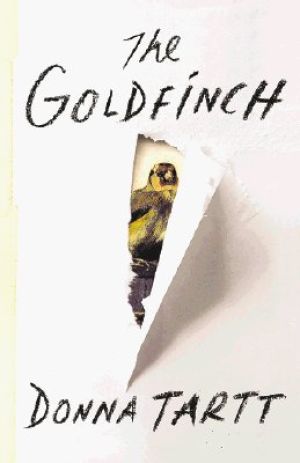At nearly 800 pages, The Goldfinch was a commitment, but it was one I was ready to make because I’d waited a year for this book to come out in paperback. During that time, it sat comfortably on the New York TImes Bestseller List, won a Pulitzer Prize, and acquired movie rights – and rightfully so.
 The Goldfinch begins with Theodore Decker introducing himself to us – his anonymous reader – as an adult in Amsterdam. He’s ill with some sort of fever and tells us that his life is severed into two parts: before his mother’s death, and after. Then we jump back in time at his re-telling to learn what happened.
The Goldfinch begins with Theodore Decker introducing himself to us – his anonymous reader – as an adult in Amsterdam. He’s ill with some sort of fever and tells us that his life is severed into two parts: before his mother’s death, and after. Then we jump back in time at his re-telling to learn what happened.
Theo was thirteen, a single child to his single mother in New York City, and had just been caught smoking a cigarette at school with a bad influence of a friend. On the way to a parent-principal conference, Theo and his mother stop at the Metropolitan Museum of Art to kill a little time. His mother shows him her favorite painting – The Goldfinch, a 1694 oil on panel a little bigger than a piece of paper. Just as Theo’s eyes leave the painting and gaze upon a spunky redhead at the museum with what looks like her grandfather, an explosion rocks the wing, destroying several works of art, killing a handful of people, including Theo’s mother.
In the rubble, disoriented and in shock, Theo finds the older man he saw with the redhead. The dying man says a myriad if disjointed things, then gives Theo an old ring and tells him where to take it. In the confusion of it all, Theo also takes The Goldfinch and leaves the museum through a back door.
All of this happens within the first fifty pages.
The journey Theo takes is a long, winding one filled with guilt, drugs, travel, and unquenched desire – all with The Goldfinch in tow. Welty (the old man) and Pippa (the redhead) inadvertently set him on a path to Hobie (a restoration expert), while the loss of his primary parent sends him first to a wealthy family in the city and then to Las Vegas to live indefinitely with his addiction intrenched father and his sketchy girlfriend. There he meets Boris, a Russian transient who becomes one of the greatest influences of his life – and the reason Theo winds up in Amsterdam.
Always at Theo’s heels is the knowledge that he has stolen a priceless piece of art and the fear that he will one day be caught.
Even though this story rocks my socks off, it isn’t without a few slow parts and heavy-handed description that could’ve been whittled. The end is particularly laden with lecture. Tartt’s few bits of lengthy drivel are probably the parts that warranted mixed reviews from some prominent literary critics, but they didn’t deter my own enjoyment. It was an engaging story, so sad at times, but thrilling at others.
At its core, The Goldfinch is a testimony to how art speaks directly to its viewer – how one interpretation is just as valid and moving and specific as the next. Art allows us to “speak to each other across time,” as Theo says, connecting us in cosmic, desperate ways.
“For if disaster and oblivion have followed this painting down through time — so too has love.”
For that, if no other reason, it’s beautiful. It has a firm place in my top ten favorites of all time.
